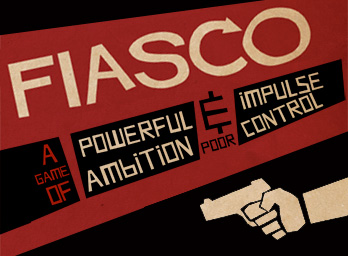Please define narrativism in plain English, in your own words, without resorting to tautology or quoting Edwards.
I've done this, in multiple threads.
Narrativism is the use of RPGing - which is a particular way of creating fiction - to the goal of creating dramatic stories, in the sense in which Jane Austen, Leo Tolstoy, Zadie Smith, Chris Claremont and the writers of Days of Our Lives all set out to create dramatic stories.
What is distinctive about RPGing is that there are multiple participants with asymmetric roles: "players", who author the actions of protagonists, and "GMs" who narrate adversity.
Narrativist RPGing begins with the players creating PCs who have dramatic needs - impulses to action of the same sort that characters in dramatic fiction have. These typically come from within the character (think eg the various characters in The Princess Bride) but sometimes are more external in their origins (eg Tenar in The Tombs of Atuan has to navigate her way through complex social relationships as well as her relationship to the powers that she serves).
The GM's job is then to present situations - "scenes" - that put pressure on the PCs' dramatic needs and in that way compel the players to declare actions for their characters. The compulsion operates in this way: the players are expected to "inhabit" their characters and declare actions as if they were their PCs. (I've seen some people call this sort of thing "method acting" RPGing.) Thus, the player is moved to declare actions in pursuit of whatever it is that drives their PC. Comparing to more conventional literary forms, it's as if the protagonist were self-authoring.
The resolution system needs to be one which allows the players' conceptions of
why their PCs care about the situation to feed through into the outcomes of their action declarations. Generally, if an action succeeds then that feeding through gives the PC at least some of what they want, while if it fails the adversity that the PC is confronting is reinforced or further developed. These outcomes - "consequences" - are picked up on by the GM and fed back into the situation(s) they are presenting.
The requirement specified in the previous paragraph requires some departures from widespread RPG resolution techniques. Most importantly, it requires that consequences
not be determined by the GM's reasoning about an already-established or already-imagined fictional situation, that is then extrapolated by incorporating into the imagination whatever it is that the PC has done. Because that technique will
not guarantee either that success on an action gives the PC at least some of what they want, nor that failure reinforces or further develops adversity. In RPGs designed to support narrativist RPGing, there is a lot of diversity in the approaches to action resolution used to ensure that the requirements for narrativist play are met.
The outcome of narrativist RPGing will be a dramatic story, but not one which anyone authored or planned in advance. The protagonists will fare well or poorly depending on how the dice fall, and the actions and fates of the protagonists will express some sort of "point", a reflection of the participants' and especially the players' ideas about whatever was thematically salient in their play.
The most natural contrast with narrativist RPGing is something like the DL modules, which are full of theme and drama, but can produce that in play only by constraining the actions that the players declare for their PCs, and ensuring that the pre-authored outcomes come to pass in the actual course of play.



